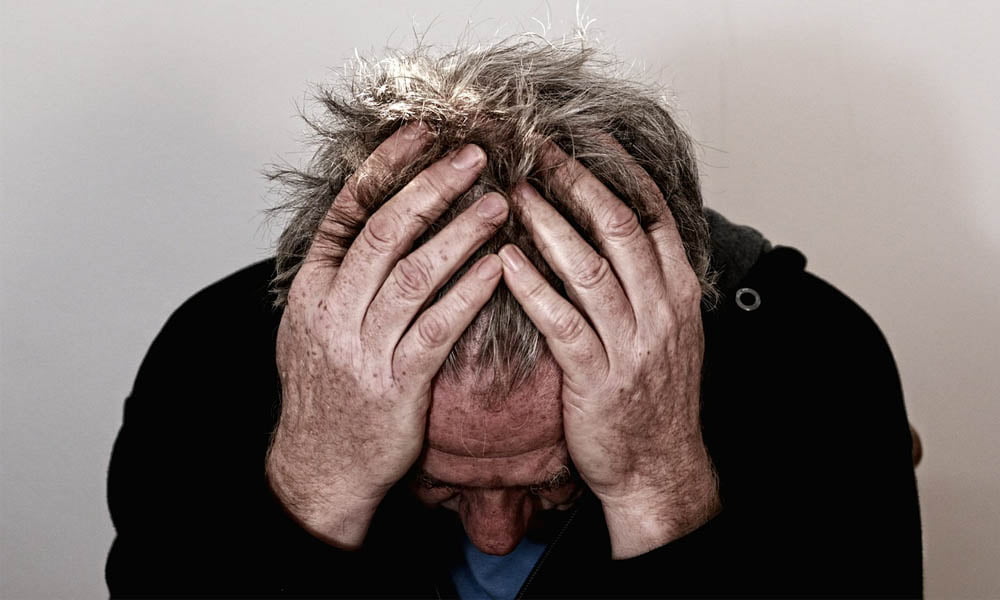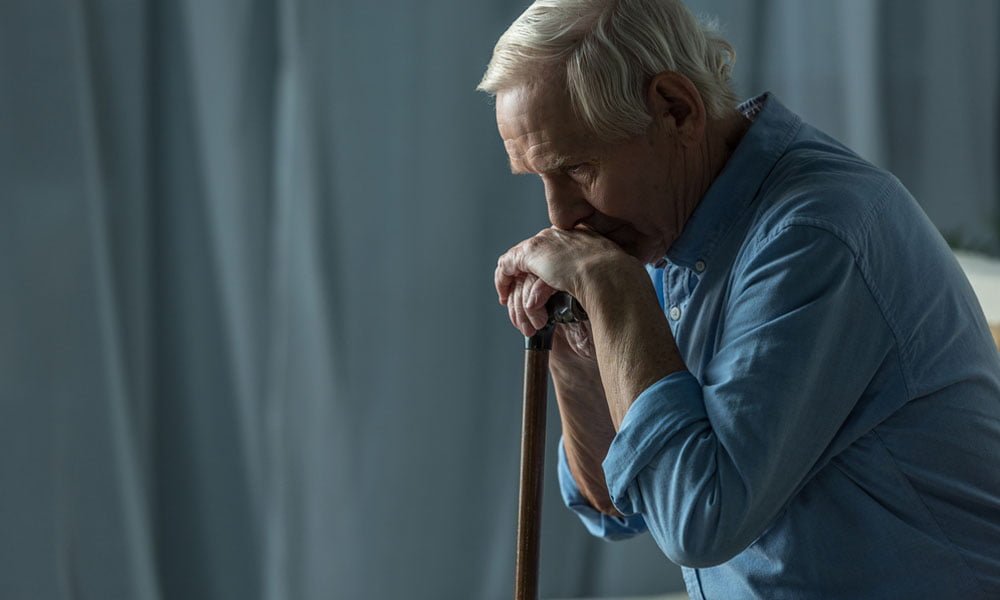Depression and mental health concerns can happen to anyone.
It can happen to BOTH younger adults and the elderly. But, depression is in no way a normal part of the aging process.
There are many reasons one can fall into geriatric depression, whether substance abuse, financial issues, or whatnot.
These risk factors and troubles of an older person make them feel sad and are risk factors for suicide.
Depression in older adults is not a light matter, especially when talking about suicide prevention.
In this article, we aim to help you understand the importance of managing mental health and find an effective treatment plan for your elderly loved ones.
Elderly Mental Illness Statistics

According to the American Psychiatric Association and its published research, “Diagnostic and Statistical Manual of Mental Disorders”, about 68% of older adults aged 65 or above barely know anything about clinical depression.
Only 38% of older adults believe depression to be a health problem. Most of them will handle it themselves, while 42% of them seek professional help.
According to the National Institute of Mental health, clinical depression affects over 19 million Americans every year regardless of age, race, or gender.
The Centers for Disease Control and Prevention (CDC) states that depression affects about 1%-5% of the general elderly population.
Unfortunately, when depression coincides with other medical illnesses, it is often overlooked or untreated.
What Is Elderly Depression?
Geriatric depression or clinical depression in older adults is an emotional disorder and mental health illness. It is the occasional feeling of sadness and “blue” moods.
It doesn’t always meet the full definition of major depression, but if it is lasting and left untreated, it can.
Mental health and depression among older adults are often not taken as seriously as they should be. Many seniors will deny or not recognize the symptoms of clinical depression.
That should not be the case as depression is a treatable medical condition.
Recognizing the symptoms of depression is key to arriving at an effective treatment plan because there is still more to life!
What Are the Symptoms of Depression in the Elderly?
Have you ever lost interest in the hobbies you used to enjoy? Do you feel helpless and hopeless throughout the day?
Regardless of age, family history, or previous achievements, depression can happen to anyone.
You are not alone!
When life changes as we age, such as declining health or the death of a loved one, this might trigger depression.
This can affect your energy, appetite, sleep, and interest in work and relationships.
Depression in older adults will manifest for at least two weeks.
A senior will appear to be in a depressed mood for most of the day almost every day. They will find no pleasure in practically every activity.
The following are the most common symptoms of depression in an older adult:
- Persistent sadness and feelings of despair
- Frequent crying or tearfulness
- Pacing and fidgeting
- Unexplained aches and physical problems
- Memory and concentration issues
- Oversleeping, sleeping through the day, difficulty falling or staying asleep
- Gastrointestinal problems, weight loss, and loss of appetite
- Withdrawal from social activities
- Loss of interest in hobbies
- Slowed speech and movement
- Lack of motivation and energy
- Feelings of hopelessness and helplessness
- Feelings of worthlessness or self-loathing
- Increased drug or alcohol intake
- Fixations on death and thoughts of suicide
- Neglecting personal care and hygiene
In most cases, depression and sadness go hand in hand. But many depressed older adults claim they are not sad at all.
Instead, they nag about physical complaints like arthritis, lack of energy, and other normal signs of aging.
But many practitioners who treat depression may still consider these physical symptoms.
What Are the Most Common Causes of Depression in Older Adults?

According to an American Academy of Family Physicians study, primary care physicians often spend little time discussing mental health with their older patients.
They fail to diagnose and refer them to credible mental health institutions.
Depressive behaviors could be a significant risk factor for suicide. We sure don’t want our elderly loved ones to reach that extent!
So let’s understand what could cause depression in the elderly so that we can decide on a treatment fast:
Chronic Medical Conditions
Medical problems that are life-threatening and painful can cause depression in elderly patients. Symptoms of depression are psychological reactions to the illness.
These common chronic medical conditions include:
- Cancer
- Dementia and Alzheimer’s disease
- Parkinson’s disease
- Stroke
- Heart disease
- Lupus
- Diabetes
- Multiple sclerosis
- Thyroid Disorders
- Vitamin B12 Deficiency
Medication
Symptoms of depression in older adults can occur as a side effect of some prescribed drugs. It is riskier when you are taking a lot of medications.
Older adults are more sensitive to these mood-related side effects. The body is not as efficient at processing the drugs anymore.
Elderly patients who experience depressive symptoms when under medication should inform their attending physician immediately.
Certain medications that can cause or worsen depression are:
- Cardiovascular drugs
- Chemotherapeutics
- Antipsychotic drugs
- Anti-anxiety medications and sedatives
- Anticonvulsants
- Anti-inflammatory or anti-infective agents
- Stimulants
- Hormone drugs
Other Health Problems
Going through surgery that damages your body image can cause depression.
Physical limitations to performing and enjoying certain activities can also impact an older person’s sense of purpose.
Dementia is also common among older adults. It is difficult to tell dementia and depression apart as they have very similar symptoms.
These include:
- Memory problems
- Sluggish speech
- Lack of concentration
- Disoriented movements
- Low motivation
Loneliness and Isolation
There are other causes of depression that are not medical.
With old age, you will experience a dwindling social circle due to deaths, changes in circumstances, or relocations.
Some elderly people will also end up living alone, especially when they lose a spouse or partner.
The death of friends, family members, and pets can take an emotional toll on the elderly, thus causing depression.
Fears
Fear of death, anxieties over financial problems, relationship problems, and health issues can increase the risk of depression.
Feelings of neglect or burden among older adults can also make them feel worthless.
How Does Depression Affect the Elderly?
Many depressed adults don’t believe depression to be a real illness.
We have to understand they were raised at a time when mental health problems were stigmatized and misunderstood.
Most of them will be too proud and ashamed to ask for help.
Depression in older adults will make them feel like a burden to others. Feelings of worthlessness and hopelessness will be prevalent.
It will impact the person’s ability to perform daily tasks.
If you have an elderly person you care about suffering from depression symptoms, offer them emotional support.
You can also schedule their medical appointments. Make sure they get an accurate diagnosis and appropriate treatment for depression.
Self-Help Tips for Elderly With Major Depressive Disorder

As an older adult, overcoming depression may take a lot of personal effort. It also needs support from loved ones.
There are a lot of small self-help steps you can commit to doing.
You don’t have to rush yourself to feel hopeful and energetic again. A little change day by day will make all the difference in your battle against depression!
1. Exercise
Exercise is a great way to combat depression.
It doesn’t have to be a rigorous workout. For example, take a short walk and see how better you feel after.
Find small ways to add more movement to your day. You can engage in gardening, grocery shopping, or stroll down your nearby park. All these little efforts will add up!
Even if you feel weak, there are many safe exercises you can still do to boost your mood.
2. Healthy Diet
It can be tempting to use alcohol or sugary and salty food to cope with symptoms of depression.
They may please you for a while but will take a turn for the worst in the long run.
Improve eating habits by taking healthy meals. They should include quality proteins, complex carbs, healthy fats, fresh fruits, vegetables, and leafy greens.
These should keep you satisfied and stable.
3. Quality Sleep
Lack of sleep makes depression worse. Make sure to get between 7 to 9 hours of sleep every night.
You can also improve sleep quality by avoiding alcohol and caffeine, sticking to a sleep schedule, and improving your sleep environment by putting on blackout curtains.
4. Engage in Social Activities
A depressed person will not want to do anything with anybody. But isolation can make depression worse!
Depression is not a normal part of aging. The elderly will need every support they have to get through these tough times.
So make an effort to connect with friends and loved ones. You can invite them over or keep in touch over the phone or online.
Other great opportunities to engage and build new friendships include joining a support group, volunteering for a charity, or enrolling in a class.
Depression Treatment Options
When self-help treatments are not enough for the elderly to overcome depression, depression treatment is as effective in older patients as in younger people.
Here are some depression treatment options:
Psychotherapy
Psychotherapy or “talk therapy” can help elderly patients identify and improve their emotions, thoughts, and behavior that otherwise contribute to their depressive symptoms.
Some approaches for the elderly include cognitive-behavioral therapy (CBT) and interpersonal therapy (IPT).
These help seniors work through stressful life changes, heal from loss, and process emotions.
Converse with a psychologist, psychiatrist, or other licensed mental health care professional today.
Supportive Counseling
Research shows that religious and peer counseling improves treatment outcomes. Support groups allow seniors to connect with others who are going through the same challenges.
It is a safe place to share experiences, advice, and encouragement. In effect, elderly patients can find new meaning and purpose in their lives.
Medications
Certain medications or medical conditions can sometimes cause symptoms of depression.
For a doctor to diagnose correctly, you have to undergo a physical exam. This includes a few lab tests and knowledge of your personal medical history.
If the doctor sees no medical condition causing your depression, they will suggest a psychological evaluation.
They should refer you to a mental health professional.
Medications for depression are usually antidepressants that balance off hormones affecting mood. A primary care physician commonly prescribes serotonin.
Electroconvulsive Therapy (ECT)
Electroconvulsive Therapy (ECT) is a brief electrical stimulation of the brain while the patient is under anesthesia.
This procedure should only be considered if the person’s depression has not improved with other treatment options.
It is often associated with suicidal patients who need immediate attention.
Repetitive Transcranial Magnetic Stimulation (rTMS)
This non-invasive procedure will only take 30 minutes to an hour. rTMS uses magnets to create pulses that activate specific regions of the brain.
This procedure is used to relieve intense sadness and feelings of hopelessness that come with depression.
Final Thoughts
Depression in older adults is an illness. It is just any normal circumstance that comes with age.
We don’t want any elderly loved one to ever suffer depression in the last few years of their life.
Wouldn’t you rather celebrate all the good memories and wonderful achievements you’ve made through the years?
If you are feeling symptoms of depression, we hope you make healthy lifestyle changes. See a doctor, get diagnosed, and follow their advice too.



